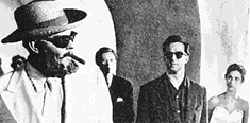
Welles' 1955 paranoiac thriller delves deeper into matters regarding memory, identity, privacy and anonymity all in the service of tremendous wealth. An interesting film that Welles may have believed to be more complex than it actually is is made tedious by a poor print and sound transfer. In addition to the DVD production flaws, a painfully embarrassing Tony Curtis introduction (he's wearing gloves. . . for no good reason!) and afterword taint what might be a gripping drama of international intrigue, murder and love.
The story begins with a killing at a wharf, mimicking in certain respects plot elements from
The Lady from Shanghai albeit from the viewpoint of the onlookers rather than the perpetrators. The conditions of perspective, both visually and intellectually, are what set Welles films apart from Hitchcock in that both directors are extremely visual, yet Welles somehow prefers that his stories remain open-ended to the audience in terms of meaning and Hitchcock tends to resolve things very neatly, if sometimes unexpectedly and unrealistically.
Following the wharf murder we chase Arkadin's real identity backwards and forwards in time - after all, he is different things to different people. Arkadin's generosity and munificence belies his sinister past; his amnesia hides his secrets and protects his reputation, thus maintaining his beloved daughter's impression of him. Tracing the story introduces us to all the relevant figures in Arkadin's former life, but strangely, the telling becomes rote too quickly, leaving little to the imagination. Welles' flawed sense of Arkadin's mystery keeps us from having any investment in the personal entanglements, much less the characters themselves, despite their exoticism, eccentricities and bizarre attachments to Arkadin's life.
What might've been the central metaphor of the film is shown in the first scene - the empty plane cruising aimlessly - but Welles never brings us back to it with meaning. It's a beautiful image, but ultimately is just rendered a cheap plot device that connotes some existential mirage; an empty vehicle careering downward, literally following the story arc. Outside of that image is little more than your standard tale of high stakes globe-tripping. Where a story like Fitzcarraldo provides ample sustenance visually and intellectually, confusing even the director (see
Burden of Dreams for proof),
Mr. Arkadin unsuccessfully conflates narrative and critique and artifice with suspense.
It's unfortunate the film doesn't live up to its promise. Welles assumes too much about the audience's belief in his filmmaking ability and the magic he typically orchestrates. He also leaves too many loose ends in an atypical fashion; one grows accustomed to open-ended films but in this case too many questions remain unanswered - which government nearly fell? Why? It's as though
Arkadin were edited in one take followed by studio butchery without equal. Whether or not that is the case I don't know, and we're not offered any chance for further exploration thanks to the paltry extras.
------
Despite a full month's hiatus from Welles blogging, I hope to continue with renewed interest soon. Apologies for the work stoppage, but my wedding and first vacation in three years intervened. But fear not, a new and exciting program at
Philadelphia's International House caught my eye (and I'm trying to keep track via Myspace's convenient events calendar) and
Bryn Mawr remains indifferent to the seemingly inexorable advance of commerce over art -
Saraband will be seen in the theater!
Upcoming screenings likely to include
The Aristocrats,
Last Days,
Grizzly Man,
2046 and
The Conformist! Let's pause momentarily and give
A Girl and A Gun, now silent, his due.
R.I.P. George Fasel. It's a strange tribute to film blogging that such vibrant and interesting writers found their way into unremunerated, yet undaunted criticisms, are discovered and appreciated, each in their own quiet corner of the theater.


